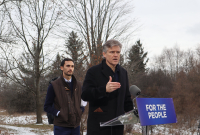Support strong Canadian climate journalism for 2025
Ontario and federal environment ministers remain locked in a stalemate on climate action, but characterized their discussions Thursday as useful and constructive.
Ontario Environment Minister Rod Phillips said he and his federal counterpart, Catherine McKenna, discussed Ontario's climate plan and such areas of agreement as protecting species at risk, plastic pollution and conservation of the Great Lakes.
McKenna said the meeting was useful, but blamed Ontario Premier Doug Ford for taking the province a “step back” on climate action.
“Unfortunately on climate, minister Phillips is in a tough position,” McKenna told reporters. “He understands the need for action and the economic case, but the challenge is that Premier Ford seems intent on making climate change a partisan issue.”
After the meeting, Phillips said he believed Ontario would be eligible for environment funds the federal government withdrew and redirected after the Ford government cancelled all the previous Liberal government's climate policies. But McKenna said the money will not be returned.
They met a week after Phillips unveiled his $500 million “made-in-Ontario climate plan,” which promises to cut the province's carbon pollution in line with Canada's obligations under the Paris climate agreement by investing in clean technologies and creating a program encouraging green projects in government contracts.
Ontario climate plan 'thin on details,' says McKenna
The plan also includes “compliance flexibility mechanisms such as offset credits and/or payment of an amount to achieve compliance” with greenhouse gas emission reduction goals. Critics have interpreted that as a carbon pricing plan and mocked it because the Ford government killed the former Liberal government's carbon pricing policy, a cap-and-trade system of buying and selling emission credits with companies in Quebec and California.
“I think we’re going to make the point at every chance we get that Ontario is going to hit the Paris Agreement targets agreed to by the federal government, and we are going to do that without the federal carbon tax,” Phillips said Thursday.
Many details, however, still need to be worked out.
The Ontario plan is “thin on details,” said McKenna, and there’s evidence that paying polluters not to pollute doesn’t work.
“We’ve seen that in Australia, where their emissions were going down when there was a price on pollution and when polluters were (paid to not pollute), emissions went up,” said McKenna. “It shouldn't be free to pollute or there will be more pollution.”
Ontario plans to create an Ontario Carbon Trust, which includes the $50-million reverse auction, where businesses can bid on contracts for green programs.
Phillips said his ministry believes the carbon trust may mean Ontario now qualifies for money from the federal government's Low Carbon Economy Fund (LCEF).
In November, McKenna announced that she would reallocate a $420 million portion of the fund previously earmarked for Ontario directly to cities, hospitals, universities, schools, and businesses for energy efficiency programs and other measures to reduce greenhouse gas emissions. On Thursday, she said they'll be moving forward with that plan.
Room for partnership with feds, says Ontario environment minister
The initial announcement that Ottawa was cancelling the transfer payments came shortly after Ford’s decision to cancel all of the province’s green programs – including cap and trade – rendering Ontario ineligible for the federal program.
Phillips said both environment ministers have asked their teams to look into the vehicles for federal environment funding that could be available to Ontario.
Phillips said he was encouraged by the meeting, a departure from previous encounters between the ministers. Last month, Phillips took umbrage at the misspelling of his name in a letter from McKenna about Ottawa’s plans to redirect LCEF cash. The ministers’ first meeting was followed by Phillips sharing a picture of himself across a boardroom table from McKenna, with the message, “I made it clear in my meeting this morning with (McKenna) that Ontario will never accept the Trudeau Carbon Tax.”
“There are good areas for partnership,” Phillips told reporters Thursday after the meeting. “We agreed that there were some areas to disagree but I was pleased with the number of areas that she thinks are positive.”
With or without Ford’s interest, McKenna says that the federal government is committed to working with the province.
“Ontarians are worried about climate change,” she said. “We saw people literally dying of extreme heat. Flash floods – I met paramedics that had to save people from elevators this summer. We see forest fires, droughts, and we need to be working together and so we're committed to working with Ontarians.”







Comments